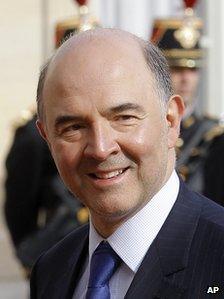French finance minister Moscovici questions fiscal pact
- Published

Mr Moscovici said the fiscal pact must include a chapter on growth
France's new finance minister has reiterated that the country's new socialist government will not ratify the European Union's (EU) fiscal pact.
Pierre Moscovici said the pact would have to include provisions for growth before France signed up.
The fiscal pact aims to ensure governments keep a tighter control of spending to reduce debt levels.
French President Francois Hollande is campaigning for a greater focus on growth alongside austerity.
Austerity alone, he says, will not solve the eurozone debt crisis.
"What has been said quite clearly is that the treaty will not be ratified as is and that it must be completed with a chapter on growth, with a growth strategy," said Mr Moscovici in a television interview, his first public comments since his appointment.
However, he also addressed concerns that France may go soft on budget discipline.
"I want to be very clear - Francois Hollande has said it repeatedly - we must tackle the public debt [and] reduce deficits. That is fundamental - a country that runs up debt is a country that is getting poorer."
By way of example, the government said it would be imposing a 30% pay cut for the president and all ministers.
Mr Moscovici's comments come within days of Mr Hollande's first meeting with German Chancellor Angela Merkel in which they discussed the economic crisis gripping the eurozone.
Christine Lagarde, Head of the IMF:, ''We have to be technically prepared for anything''
Twenty-five of the 27 members of the EU have signed up to the pact, but it still needs to be ratified by individual states.
An increasing number of commentators and politicians are beginning to question whether austerity alone is the best way out of the crisis.
With a number of European countries back in recession and figures released this week showing zero growth in the eurozone economy as a whole for the first three months of the year, calls for some stimulus measures to balance austerity are growing.
'Orderly exit'
There is also a growing realisation that Greece may be forced to leave the euro. The majority of voters rejected austerity in elections earlier this month and Greece will return to the polls in June.
One of the most popular parties is promising to freeze payments to creditors and renegotiate the terms of bailout loans from the EU and International Monetary Fund (IMF).
For the first time, some politicians and finance chiefs are now acknowledging publicly that Greece may have to give up the euro.
"If [Greece's] budgetary commitments are not honoured, there needs to be appropriate revisions, which means either supplementary financing and additional time, or mechanisms for an exit, which in this case must be orderly," said IMF head Christine Lagarde.
She acknowledged an exit would be "extremely expensive and would pose great risks", but said it was "part of the options that we must technically consider".
One of the key risks of Greece leaving the euro would be the knock-on effects on other eurozone economies.
Spain and Italy are seen as the most vulnerable, with borrowing costs for both countries rising in recent days, suggesting investors are becoming increasingly nervous about their ability to repay their debts.
"The core question will be not Greece, but Spain and Italy," said World Bank president Robert Zoellick.
"Where the danger comes in is when events come and they start to affect confidence and you get illiquidity moments, and illiquidity moments start to mean something begins to tumble, whether it's companies or banks," he said.